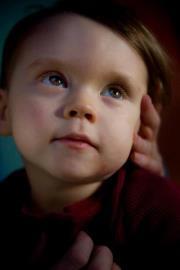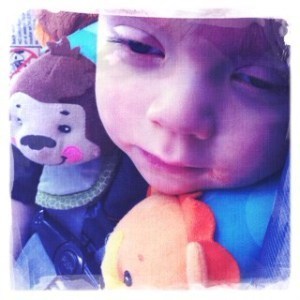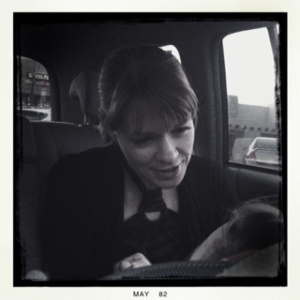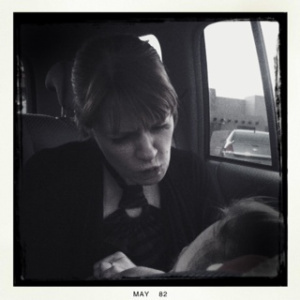Emily Rapp's Blog, page 2
August 23, 2012
Precarious Life, an essay by Sarah Sentilles
This beautiful essay by Sarah Sentilles arrived today in my inbox at just the right moment. I find myself at a loss for words, and want to let her voice – and her message – speak for itself.
Precarious Life
Sarah Sentilles
August 23, 2012
There’s a temptation to turn Emily’s experience with Ronan—to turn Ronan’s experience with Emily—into something abstract. Mother and child. Pieta. Abstraction is more manageable somehow, packaged, known, removed.
I can’t imagine what you’re going through, people say to Emily.
Yes, you can, she says. You just don’t want to.
But Emily and Ronan’s daily life is anything but abstract. It’s concrete. Sleeping. Feeding. Choking. Shaking. Bathing. Clothing. Changing. Carrying. Breathing. Drooling. Soothing. Syringes lined up on the coffee table filled with liquid medicine flavored mint, flavored grape, its consistency too thin, so hard for him to swallow.
Ronan can’t see and he can’t move very much, but he responds to Emily’s voice, orients his body, his eyes, to the sound of it. Do you think he knows who I am? she asks.
Yes, I say.
Mama.
We took Ronan with us in his stroller wherever we went, his head held up by stuffed animals—lion, monkey, bunny, elephant—his guardians, his guides, his spirit animals.
People looked at him, stared at him, trying to figure out what was wrong, and then they looked away.
Lucky guy, a waiter said when he noticed Ronan was asleep, yet another reminder Emily’s life is not the way others assume it is.
I teach college students—many of them artists—and my favorite book to teach these days is Judith Butler’s Precarious Life: The Powers of Mourning and Violence. Butler takes two things that are usually understood as isolating—grief and the body—and develops an ethical system based on connection and responsibility. Our bodies have public dimensions, Butler argues. “The skin and the flesh expose us to the gaze of others, but also to touch, and to violence, and bodies put us at risk of becoming the agency and instrument of all these as well.” My body, she writes, both is and is not mine. Each of us is implicated in lives that are not our own.[1]
Nowhere is this clearer than in mourning. When someone you love dies, Butler writes, you will never be the same, and it is this experience—this recognition that when you are lost something of me is lost, too—that shows our essential connection to one another. Grieving reveals who we are, Butler argues, reveals what it means to be human; grieving exposes our fundamental need for and dependence on others. Our ties to others constitute what we are. Others compose us; there is no “I” apart from “you.” If I lose you, I not only mourn the loss of you, but I become inscrutable to myself. Butler asks, “Who am I without you?”[2]
“Let’s face it,” she writes, “We’re undone by each other. And if we’re not, we’re missing something.”[3]
Emily’s grief is public grief. When Ronan was diagnosed, Emily could have turned away from the world, closed her life down, stayed inside, but she has chosen to do the opposite. The door to her home is left open. If you were to walk into her house today, she would hand you her son.
This is Ronan. Hold him.
I spent most of my time in Emily’s house holding Ronan. His legs straddling my stomach, his chest on my chest, his face turned to one side, his head just under my chin, the weight of him, the weight of someone dying—which is all of our weight.
Love is all you need, Ronan’s t-shirt said.
His little perfect beautiful body is heavy, and being with him, holding him, felt nothing like what I’d imagined. When I thought about visiting Emily and Ronan, I imagined I’d cry the whole time. I imagined it would be dramatic. Frightening. Strange. But it was peaceful. Quiet. The sound of Ronan’s breathing filling up the room. The sound of bottles being washed, of prunes being mashed, of the dishwasher being emptied. The sound of Emily talking to her son.
Hello, my beautiful boy.
There is no question about what will come next, though how and when remains a mystery. It will come. And there is nothing anyone can do to stop it.
What kind of community will we be for Emily and Rick and Ronan? How will we hold them? How will we let ourselves be undone?
Emily has made her grief public, but I know she often feels alone. Her book about Ronan is called The Still Point of the Turning World, and “still point” is how Emily sometimes describes her life—as if she is one place, stopped, while most of us circle around her, going on with our lives, our ordinariness.
I talked to Ronan while I held him on Emily’s couch, my back supported by pillows, a mockup of the cover of her new book propped up next to me, Ronan’s weight rooting me to the earth. You’re okay, I said when his limbs tightened, when his arms shook, when he startled. I don’t know if Ronan could hear me, and if he could hear me, I don’t know if he could understand what I said, but I can see now I wasn’t only talking to him. I was talking to me. I was talking to Emily. Oh, sweet baby. I’m here. I’m here. I’m here.
[1] {Butler, 2004, #201@26-28}
[2] {Butler, 2004, #201@22}
[3] {Butler, 2004, #201@23}


August 12, 2012
National Day of Hope for National Tay-Sachs and Allied Diseases Alliance in Honor of Ronan Louis
Saturday, Sept. 22, 2012 at Backroad Pizza, 1807 2nd Street #1, Santa Fe, NM 87505, 2 pm – 5pm.
Art Auction and Live Music. All proceeds go to help families with children living with Tay-Sachs and other similar life-limiting diseases. Learn more at National Tay-Sachs and Allied Diseases Alliance.
RSVP on Facebook - https://www.facebook.com/events/130611087082935/


August 10, 2012
Sunday Rumpus Essay
“Grief – like social class, its sociological equivalent – is the greatest divider, but it is also a leveler. Not everyone is going to “raise their rank” or be born with one, but everyone will experience grief.”


July 11, 2012
New article on Salon.com
Someone to hold me: As I face my son’s inevitable death, I realize how little I once understood grief, or how to help a person in pain.
http://www.salon.com/2012/07/12/someone_to_hold_me/








July 10, 2012
The Waiting Game
The Waiting Game
Vikings never ask, are we there yet? instead, they scan the horizon, armored hips
pressed against the railing
It’s not Russian roulette, or regular roulette where a tiny white ball jumps the track
and slowly sinks in a marsh of bile
Vikings try to sneak up on you but they’re noisy with their helmets rattling
against branches, not to mention their laughter, almost always overdone
It’s true, one day the Operating Room nurses will take your baby down a far-off hall,
where she’ll get smaller in their arms until they turn a corner and assemble
around her to open her belly like the bow of a Viking ship opens the sea
It’s nothing where you see the end like the line for a roller coaster,
but more like waiting for the nurses to leave so you can down
another bourbon
And you go to sleep with waiting and rise with it curdled on your tongue
Or bracing for the Mississippi to crest thirty-two miles from shore
Or waiting for a B positive liver to be offered to Texas Children’s Hospital,
in Houston, room 1222 where your loved ones are down under
three inches of bile
Several nurses and doctors will tell you it’s a waiting game and games,
you like games
I knew a Viking that was afraid of water
Vikings, like anyone, love that rush they can’t stop, that pressure up form their hearts
into their heads, before they sob
Don’t worry, you can write instead of crying
It’s Hermann Hesse’s Journey to the East—which is mostly in your mind—and about
not giving up on God the moment He seems to have disappeared
like the moment his characters delve into the gorge of Morbio Inferiore
It’s all the waiting God controls the odds of, like waiting for a tornado’s
hot and cold to split, and by now you’re wishing the phone would ring
with a B positive liver offer for your daughter, but in your heart
you doubt it will, because God has something left to teach you
Has to make you suffer or accept through some hardship, you can’t even imagine
or worse, there is no God, just a pile of syringes, a bayou of bile, and of course,
that brackish breeze
When Vikings don’t have phones, they use screaming or fire
It’s not waiting for a hangover to recede or a taxi ride to Rothko Chapel where maybe
under the onus of art you’ll find God
It’s not Leif Erikson but The Wreck of Hesperus, one’s daughter bound to the mast
in a hurricane
Will your faith make it? do you trust these are divine dealings? no answer?
are those eagles you see circling above her hospital crib, are they here
to claw out her liver, will it grow back again?
It’s not Eastern medicine or Western or talking to the trees or crossing the street
when you’re not supposed to, it’s a butterfly in a blizzard and a satellite
looking down, it’s a hospital room under an ocean of bile and the nurses
laughing at your spine like a dorsal fin swishing, breaking the surface
There was one Viking who was very polite, though in the evenings he found a darkest
corner of the ship to listen himself cry
If only your heart was broken, how easy life would be
I’m not sure if it’s like waiting for love, I can’t say because I’m in the thick of it,
like Leif Erikson before he went pro, I’m franticly scanning for land,
waiting for winds, chased by a salt lens three miles wide, when the water runs out
and a grey bank of clouds shrouds my vessel and acts as baby’s breath
in the bouquet of my sinking








July 8, 2012
Poem for a Lost Birthday
Poem for a Lost Birthday
Like a lover, your life bends down and kisses your life. – Jane Hirschfield
Today you are — years old.
A dream:
I followed a man
for whom I carried compliments
and a stack of graded papers
marked with “A’s.” In his house
two children sat in a tidy kitchen.
A woman with straight dark hair
moved down the hallway. I left
a handprint on the bare wall.
This man led me to a room.
He had washed my silk underwear, my
bra, a shapeless sweater that sunk
the drying rack.
“How are your silks?” he asked.
I collected my garments and became undone.
My hair grew long and changed color. The heels
of my white shoes sunk into the grass as I ran.
You can only miss what you continue to love.








June 28, 2012
June 28, 2012
That, finally, is all it means to be alive: to be able to die
-J.M. Coetzee
In Preparation for a Death
So this is the labor:
scooping up the dry
bodies of flies
from beneath the meditation mats,
watching the dark
cluster in the dust pan,
I’m thinking about the time
I barfed on a subway platform.
It was very late, and I
imagined the person
who would take care of my vomit
before the morning commute. She
wore orange pants. Her fingernails
were clean. Her hands were very strong.
I wiped my mouth and got on the train.
In this way we are all the same.








June 3, 2012
Monkey, Baby, Lion – Guest Post by Weber
Last March I visited Emily, Rick and Ronan in Santa Fe – this was the first time I had met Ronan, and it was shortly after his Tay-Sachs diagnosis, in January 2011. This May I flew from Boston to ABQ to visit again.
I’d heard from Emily about how Ronan is doing – through this blog, facebook, and by phone, email and text – and so had some idea of what to expect. Certainly not the changes one would usually expect in a child between the ages of one and two. As the disease has progressed, Ronan has lost his sight and seems to be always gazing at a middle distance. He can’t control his arms and legs, nor hold his head up – so he is a sweet soft lump, an oversized baby who needs cradling and support, one of which is a stuffed turkey that provides head support. He also has a neck support that has animal faces on either side. Monkey, baby, lion.
Ronan doesn’t seem to respond to any visual or auditory clues, but he occasionally makes satisfied lip-smacking sounds and happy sighing noises. I think they’re happy noises. Ronan is clearly surrounded by a tidal wave of love, and if love could cure Tay Sachs, that would’ve happened long ago.
Ronan can still eat. Slowly, mushy food and liquids, but he is still able to swallow. This is, clearly, very important. The decision to move to a feeding tube is not to be made lightly and is not something, at this time, that Emily and Rick want.
Emily has already mentioned that Ronan has seizures. With medication, the seizures are fewer, but they still happen. He has what Emily calls “screamy seizures,” where the fear center of his brain is being triggered and he cries out. This did happen while I was sitting in the backseat of the car with him – he shrieked and his little arms and legs went stiff. It lasted only maybe half a minute, and he seemed to go back into his peaceful state.
We hung with friends, old and new for both of us. We went to Chimayo, which I’ve heard so much about. On N.’s suggestion, we stopped at Lake Santa Cruz, which was beautiful and blue in contrast to all the New Mexico beige, and so, so perfectly quiet.

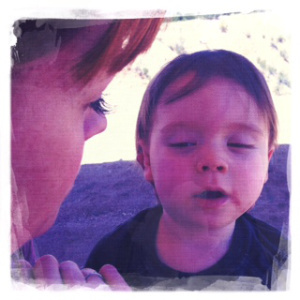 We did some kick-ass yoga and ate amazing food (has anyone else heard of
We did some kick-ass yoga and ate amazing food (has anyone else heard of
escabeche?!) We hung out in the outdoor whirlpool and missed the solar eclipse. We spoke, carefully, of what might happen next.
I think that is the hardest thing – not knowing what will happen next or when. (Well, one of the hardest things – not be able to delay or stop the disease in any way is insanely awful). Will Ronan still be with us in the fall, when Emily’s new teaching schedule begins? Will he be one of the babies memorialized at the next Annual Family Conference hosted by NTSAD (or as Emily calls it, Tay Sachs Spring Break)? Will he stop eating and begin hospice care?
Emily and I go way back. Not as far back as some her many friends, junior high and high school, but we did meet in our early 20s, and I’ve seen her through many life changes. I worry about what will happen to Emily. Everyone who reads this blog knows how strong she is. When Ronan is gone, her life will change dramatically, and I think it’s a shift that could leave even the strongest reeling.
There will be an NTSAD fundraiser in Ronan’s honor in Santa Fe in September – stay tuned for details.








May 18, 2012
Guest Blog by Elizabeth Tannen!
A beautiful post by my friend, the terrific and talented writer Elizabeth Tannen.
It’s evening in Santa Fe, and I’m standing with Ronan in his bedroom. He lies on his changing table, his body still, sheathed in a long-sleeved onesie dotted with penguins. I stand above him, beside the closet of his small, colorful clothes, next to the Big Apple Circus poster that reminds me of childhood in New York.
My response to being with Ronan is binary.
In this moment, his presence soothes me with a visceral calm: a singular sweetness, a, soft, peaceful feeling. The perfect shape of his tawny eyes, the soft of his hair and skin; I stroke his body and feel at ease.
But hours later, as I lie falling asleep in the next room, my mind lurches with the urgent, burning fury that Ronan’s illness provokes. It asks impossible questions: Why must you be this way? Why can’t you tell us how you feel? Stay longer? Be someone you’re not?
For the past two years I’ve taught creative writing to undergraduates. Teaching them to shape stories has reminded me of the basics of human nature: those things that seem obvious, but we don’t always consider. Mostly, it’s renewed my attention to the human need to know why: to seek connections, to explain why one thing leads to the next, to know how people fall in and out of love, why people get sick and live or get sick and die. How can I avoid this fate, we ask, or achieve it, myself?
At a restaurant earlier the same day I sat with Emily and Ronan and roiled with anger at an older couple sitting next to us: the ones with matching Lululemon from their morning run and stiffly coiffed hair.
Why did they fill me with such rage? I wear Lululemon, sometimes, too. They weren’t even intrusive, like the older man in a knit cap who wandered over like some self-anointed Buddha and announced that Ronan looked sleepy; or the blond woman who wondered whether he could talk.
No, this couple meant well. They admired Ronan in what seemed to them an appropriate way: pausing as they walked to their table, cooing at him, admiring his eyelashes, asking, “How old?” They smiled as they sat down and paid us no more mind. Perhaps they sensed something wasn’t right with Ronan; perhaps they didn’t.
I know this is a regular routine for Emily: the observations and, sometimes, interrogations of well-meaning strangers. With babies, as with dogs and celebrities, people feel entitled to approach. Such interactions, I imagine, are part of the landscape—wrenching and turbulent—of being Ronan’s mom.
But I’m not Ronan’s mom: I’m a friend, a piece of his world, a piece that comes in and out. And this routine isn’t something I’ve stomached enough to know how to let sit. So I watch that couple happily spoon bites of oatmeal into their mouths and I project my own anger. I project my own longing to know why—to ask (even if they don’t!) those impossible questions—and I find myself hating them for feeling exactly like me.
Ronan’s life confounds the natural desire to understand. There are no answers to the questions our minds want to ask. We don’t know, can’t know, how he feels now or will tomorrow; why, besides the cruelty of genetics, he has the life he does. Why sometimes his body trembles and shakes and sometimes rests peacefully; whether he hears the songs his father sings to him and how it makes him respond. Ronan can’t give us the kind of sense we seek.
And I wonder, as I stand above Ronan, grazing my fingers along his calf as Emily warms his bottle in the other room, if this is why he brings me—brings all of us privileged to know him—so much peace. Because we can’t ask the questions we want to ask. We can only be, in the moment, beside him, briefly touching the life he has.








April 20, 2012
Wasp’s Nest
Tonight, at the National Tay-Sachs and Allied Diseases Organization’s Annual Family Conference in Orlando, I attended a commemoration ceremony for the children who have died this year and in previous years. The name of each child was read aloud. Pictures were shown. Candles were lit. A room full of grieving people. In February I wrote this poem for Miss Elliott, the daughter of my friend Becky. I post it tonight in honor of all the children who have been lost to these diseases, and to the amazing parents who loved them each day of their lives. Deep love equals deep loss, and parental love requires emotional bravery. There’s no other way.
Wasp’s Nest
For Becky Benson
There is nothing I understand.
The nest fell to the ground. Framed
first in the window at five o’clock,
holes like a heart,
heat like a heart but empty too-
It is mid-winter, the wasps
half-resurrected. Why a space to house what isn’t there?
Here today, gone tomorrow.
There is nothing
I understand-
This moment spinning flakes
at the cold window, scabs
of old songs, old
curses. Valentine,
there is no veil
between the world
breaking
end of everything. Lying
in bed with pieces of
the fallen mind lifted
from a body,
hot snowball thrown into the gravel walk,
hell-bound rocket.
Where is it?
I found it easily
under the pile of dirt beneath
the window, snow-pressed, blown
along side, replacing what you wanted to see.
All night it was here and now what?
It is early. Time
to leave
the top of the staircase.
The upper hand
The lower hand
I have no hands,
no help.
Somewhere nearby,
far off, around this corner-
my baby swings in the bitter
peace of the dying.
If only I could strike!
Stinging and wakeful, touch it,
take it
in my mouth, end all desire-
Silence at five in the morning,
downstairs, listening: Where is it? Where-
Here all the houses are burning
but I am the only one looking
and I understand nothing
of this place.








Emily Rapp's Blog
- Emily Rapp's profile
- 91 followers


